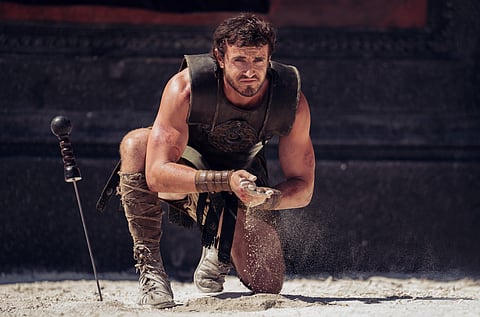

What makes a nation? Kings? Heroes? Laws? Ridley Scott presents a stirring tale of unabashed romanticism to tell us that a nation is perhaps a shared dream. Gladiator II begins with Numidian soldiers, men and women, taking up arms to defend their motherland against the invading Roman army. With his wife slain and captured to be sold as a slave, Hanno/Lucius (Paul Mescal) vows to take his revenge against the Roman army by killing its celebrated general, Acacious (Pedro Pascal). However, fate has other plans and he ends up inheriting the late emperor Marcus Aurelius’ dream of Rome.
Beyond copious amounts of bloodshed and violence, Gladiator II carries the poetic nature of the founding stories of ancient empires. We have the return of a long-lost prince, commoners rising up against corruption, the bureaucratic machine suffocating under the web of political scheming, and an empire crumbling under the weight of its own greed. Ridley Scott’s poetic touch takes a literal turn when Lucilla (Connie Nielsen) is reunited with her son through a recital of Virgil’s poem.
The veteran filmmaker takes delight in painting the opulence of Rome’s aristocracy in the same vein he captures the decadence of the empire’s less fortunate. In one scene, we see a plague-ridden woman begging for food and in the next, we see a senator throwing a lavish party with rhinoceros’ head on the dinner table.
While his Lucius might be the heart of the film, Denzel Washington’s Macrinus is the pulse that controls its tone and tempo. Macrinus stands as the perfect antithesis to Marcus Aurelius’ dream of Rome, presenting a counterpoint from every angle imaginable.
As a former slave and a master of gladiators, Macrinus schemes his way to the throne of the empire. Towards the end of the film, when he roars to Lucius, “Blood alone cannot make you an emperor” his angst at the unjust of a closed hierarchy, his rage borne of being controlled by the powerful all his life, rises up to make a compelling, argument against the romanticism at the heart of the film. Macrinus is why, when at the end Rome falls and rises up again, it stands as a republic and not as a monarchy.
Denzel Washington’s performance takes up a spatial dimension along with his signature cadence. Almost every time he enters a room, a frame, he gracefully moves from one point to another before he is directly addressing the person in front of him. In the beginning, his movements register as flamboyance and later, as he encircles his targets under his political ploy, we see his movements as a snake coiling around its prey. Even with the way he delivers his dialogues, a wave of intense friendliness belies the deceit beneath it.
Between Lucius’ fight for a dream and Macrinus’s fight for his legacy, General Acacious stands a poignant reminder about the insignificance of human strife in the face of time. “Everyone will be forgotten. Empires fall, emperors die,” he says.
One of the weakest points of the film is Lucius’ change of heart as he begins to believe in the dream of Rome. It is hard to digest his transformation. However, Gladiator II is more about how the spirit of a nation rises up to assert itself.
And that is perhaps why we get more close-ups of the raging mob inside the Colosseum, as opposed to the original film. It is also why the film ends with two armies, who are ready to clash, listen to the heartfelt appeal of Lucius and throw down their swords.
While Gladiator (2000) ends with Maximus appealing to the people of Rome to keep their dream of a nation alive, the sequel shows how in the absence of a unified dream, corruption, dangerous ideologies, and eccentric personalities with malevolent intentions, rise up to seize power.
Gladiator II is an old-school romantic tale about the power of a shared dream. It is also a cautionary tale about the dangers of discarding your ideals, both as a nation and as an individual.
Directors: Ridley Scott
Cast: Paul Mescal, Denzel Washington, Pedro Pascal, Connie Nielsen
Rating: 3/5 stars